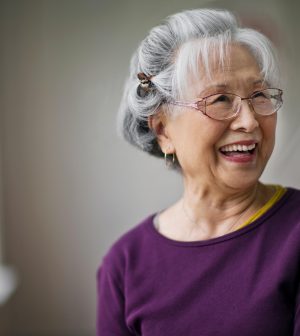- Techniques for Soothing Your Nervous System
- Does the Water in Your House Smell Funny? Here’s Why
- Can a Daily Dose of Apple Cider Vinegar Actually Aid Weight Loss?
- 6 Health Beverages That Can Actually Spike Your Blood Sugar
- Treatment Options for Social Anxiety Disorder
- Understanding the Connection Between Anxiety and Depression
- How Daily Prunes Can Influence Cholesterol and Inflammation
- When to Take B12 for Better Absorption and Energy
- Epsom Salts: Health Benefits and Uses
- See What Saffron Can Do for Sleep and Heart Health
Neighbors Make the Difference for Isolated Chinese-American Seniors

Living in tight-knit communities where neighbors are connected to one another helped improve health outcomes for older Chinese Americans, a new study found.
Rutgers University researchers used data from a study of more than 3,100 elderly Chinese people in the Chicago area to investigate whether the perception of trust and connection among neighbors had an impact on their risk of death.
The study found folks who lived alone and reported low interaction or connection with neighbors had a 48.5% higher risk of premature death than those who lived with someone else.
However, participants who lived alone but had strong neighborhood ties had a similar risk of death compared to those with housemates. The presence of helpful neighbors seemed to make a difference, researchers said.
“Older Chinese Americans who lived by themselves in neighborhoods with low cohesion were much more likely to die earlier than those who lived by themselves in neighborhoods with strong cohesion,” said study author Yanping Jiang, an instructor at the Rutgers Institute for Health, Health Care Policy and Aging Research in New Brunswick, N.J.
About 27% of people ages 60 and up in the United States live alone, according to Pew Research Center.
Living alone has been linked to depression, heart disease, dementia, poor biological health and premature death.
Social policies can help create better neighborhood environments for promoting health of older adults, Jiang said.
“Our findings show the particular challenges faced by older adults who live alone in communities with little interaction or connection,” she said in a Rutgers news release. “Enhancing neighborhood cohesion may be a promising way to reduce early death for older adults who live alone.”
Future studies should examine other factors involved in neighborhoods and how they influence the health of older adults, researchers said. The public can help by reaching out and being kind to neighbors, particularly those who live alone.
Study findings appear in the January issue of the journal Social Science and Medicine.
Research was supported by the Rutgers-NYU Center for Asian Health Promotion and Equity and the National Institute on Aging.
More information
The Office of Disease Prevention and Health Promotion has more on healthy aging.
SOURCE: Rutgers University, news release, Dec. 13, 2022
Source: HealthDay
Copyright © 2026 HealthDay. All rights reserved.










